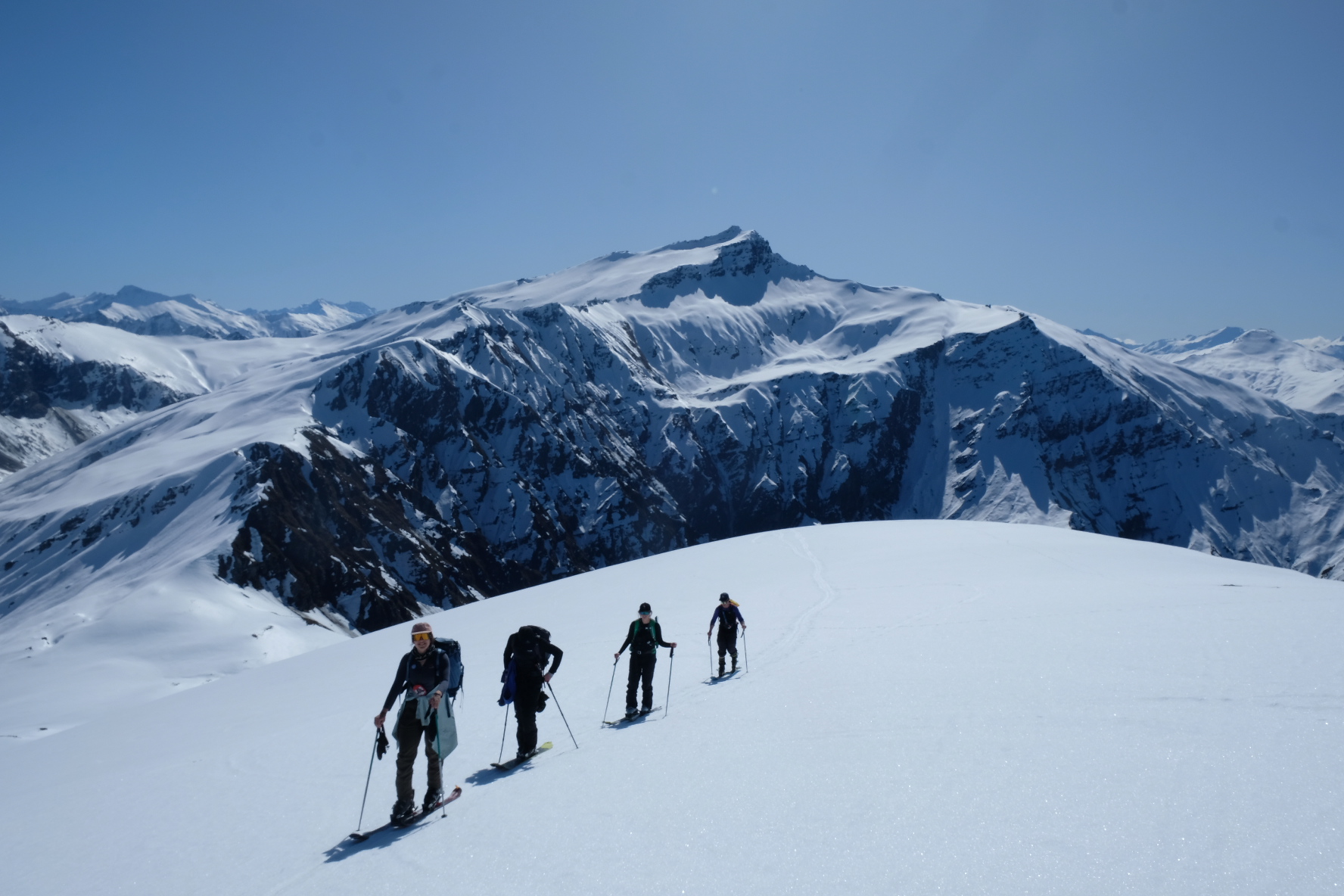
There are so many spots to wander in the wilderness and snowy deserts of New Zealand (NZ) during winter. To help our readers choose the best place to strap skins on and earn those turns, I’ve narrowed it down to five incredible areas in the Otago region. These areas offer a range of fantastic backcountry terrain, from beginner touring to advanced. In order from beginner touring to advanced, these locations are the Pisa Range, Soho Basin, Treble Cone sidecountry, Black Peak, and Remarkables sidecountry. All spots can be accessed from Wanaka or Queenstown, depending on where you’re staying.
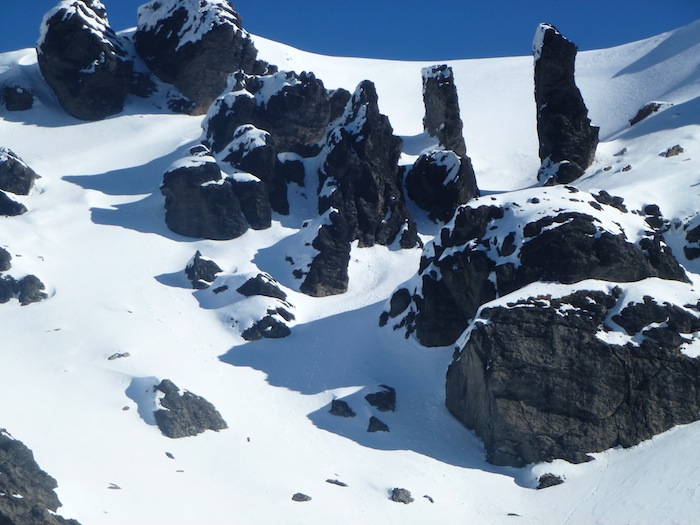
The first on the agenda is the Pisa Range, referred to as the ‘Pisa’s’ by fellow backcountry enthusiasts. The Pisa Range offers gentle backcountry skiing and touring, making it an excellent location for a first-time hiker. This gentle terrain can be found further South of the Pisa Range. The general gradient for this terrain is relatively low, from 15-25 degrees, with many flat spots. Closer to the Peak of Mt Pisa (1,963m, 6,440ft) lays steeper and more serious terrain known as the ‘Cromwell Faces.’ These faces have some awesome chutes to ski with gradients up in the mid-30s (degrees).
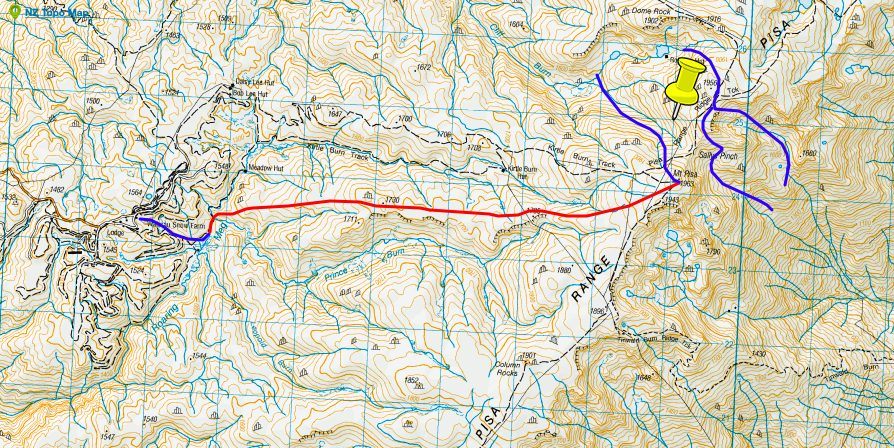
To access this terrain, drive up to Snowfarm, a cross-country skiing resort. When you arrive, you’ll see clear access gates to the backcountry, but check in with them so they know you are going out of bounds. There are two huts available to be booked in the Pisa range. For further information, check out Snowfarm’s website.
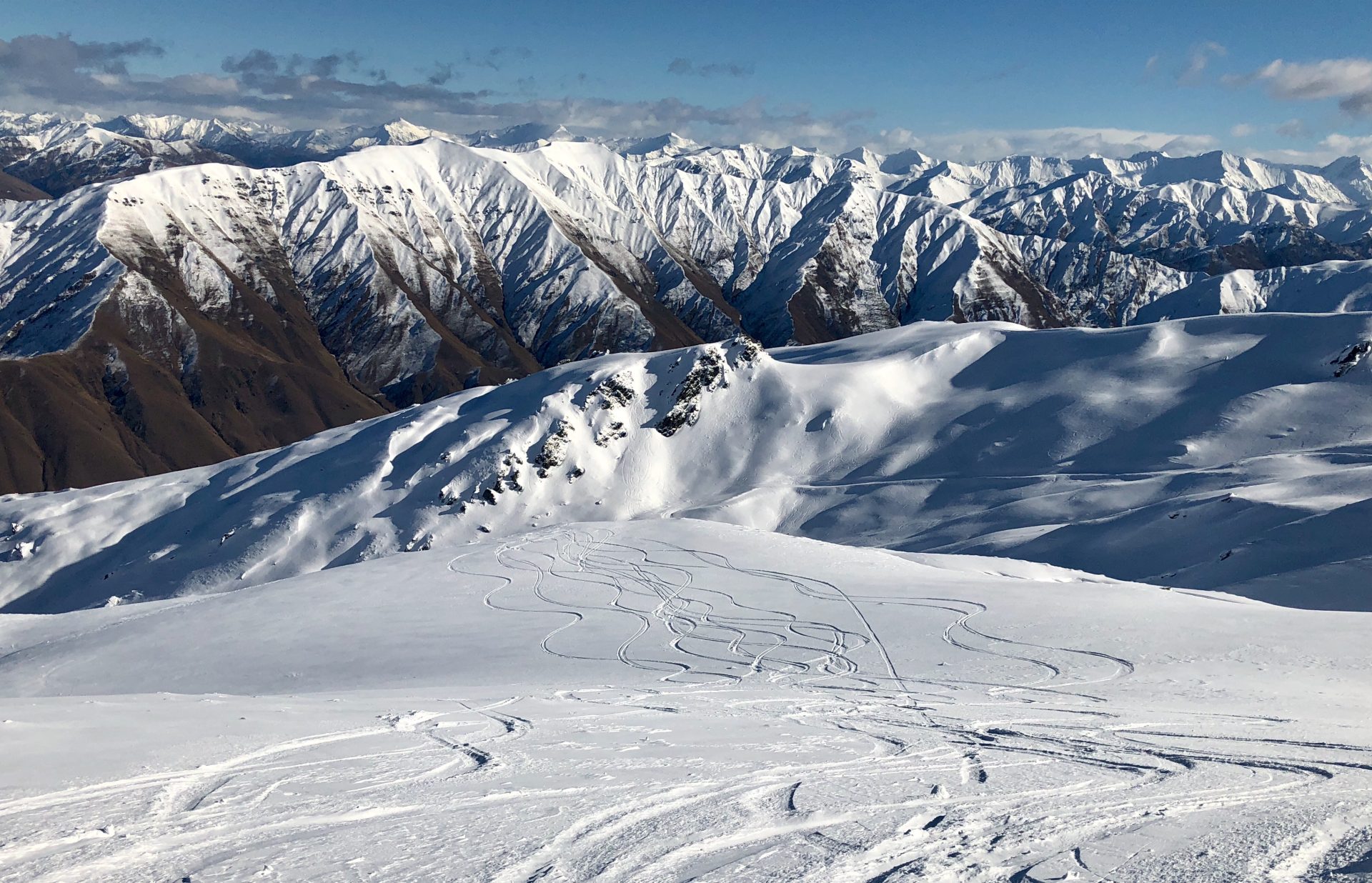
Out the back of Cardrona Alpine Resort (1,894m, 6,213ft), there are two incredible options for touring. The first spot is a commercial cat-skiing operation called Soho Basin. Soho allows touring provided the users follow the rules laid out, which can be found on their website. Soho offers a range of terrain to choose from, which makes it accessible to all. The general gradient sits between 15-30 degrees, and most of the skiable aspects are South to Southwest, creating good skiing due to NZ’s position in the Hemisphere. The terrain is epic, with convexities to pop off, little chutes, and open faces.
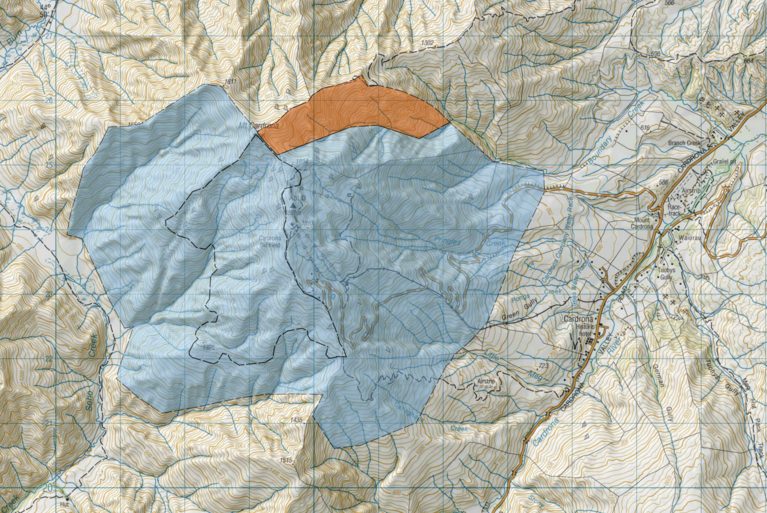
At the top of Soho is a ridgeline joining Cardrona to the Peak of Mt Cardrona (1,936m, 6,352ft) itself, and on the other side is ‘Anderson’s Bowl,,’ which is another brilliant option for touring. Anderson’s has various aspects from North East to South, with some spots offering steeper terrain up to 35-40 degrees. With these two fantastic locations offering different gradients and aspects, one can monitor the weather and avalanche forecasting to figure out the safest and best skiing possible for a day out. Both are lift accessible, but a skin track, known as ‘Thompsons Track,’ runs behind Cardrona from the second carpark, which adds 30 minutes but cancels out purchasing a lift pass. To use Thompsons before lift operation hours, check the guidelines on Cardrona’s website for safety purposes.
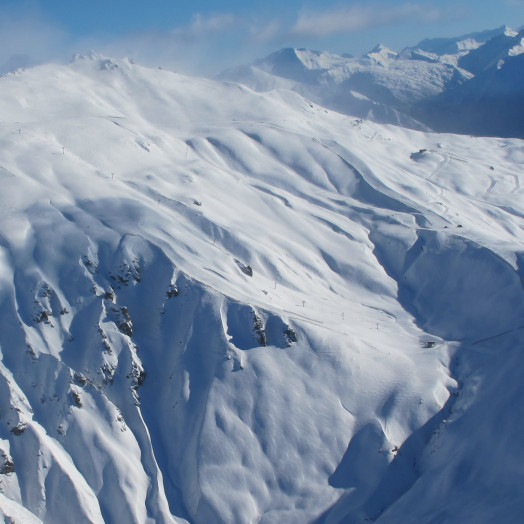
To find more exciting terrain options in the Otago area, venture West of Wanaka to Treble Cone (2,088m, 6,850ft). Treble Cone has a few backcountry gates known as the ‘Hollywood Bowls.’ These are only open weather depending, and all can be accessed by lifts. Due to the steep and narrow terrain in the bowls, they don’t often open in a season due to avalanche hazards. These gates unlock some incredible steep chutes with gnarly spines for anyone willing to have a go. These chutes have gradients ranging anywhere from 25 degrees to 50 degrees. It’s guaranteed fun wherever you go, depending on which line you pick.
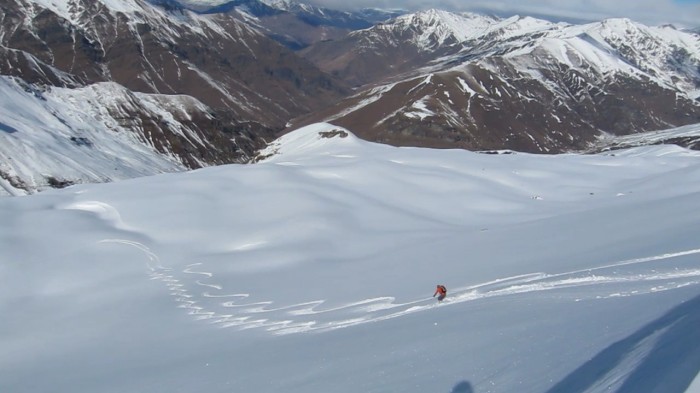
If you wish to find fresh tracks when the gates have been skied out, chuck a pair of skins on and head West of the bowls. There is some lovely skiing with a mixture of gradients, mostly mellow in the 15-25 degree range, making it nice walking and safer shredding. This area is commonly known as ‘Wedding Cake Rock’ or ‘Towers Ridge’ due to the rocky features on the ridge lines. The backside of Treble Cone also offers some unreal skiing; it is pretty steep but a lot of fun. The general gradient for the backside is 25-35 degrees, and depending on snow accumulation, you can venture further Northwest towards Black Peak, where you’ll discover some tremendous open pitches. Treble Cone asks that you check in with their ski patrol before heading out to discuss the hazards in the area you wish to go.
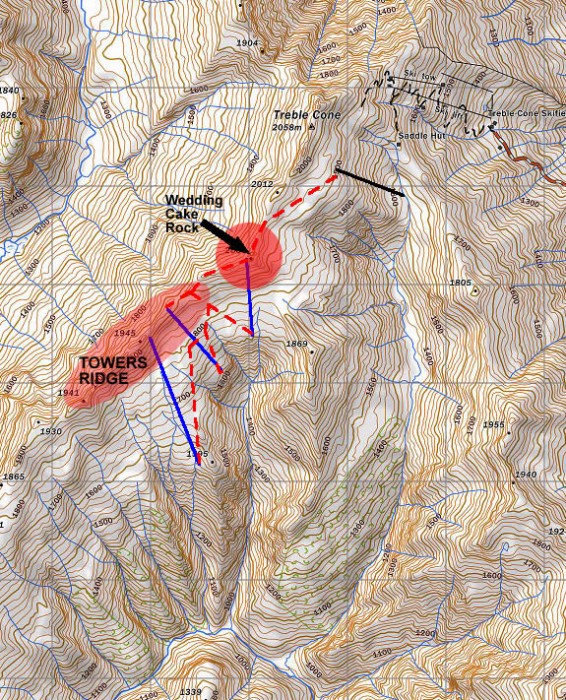
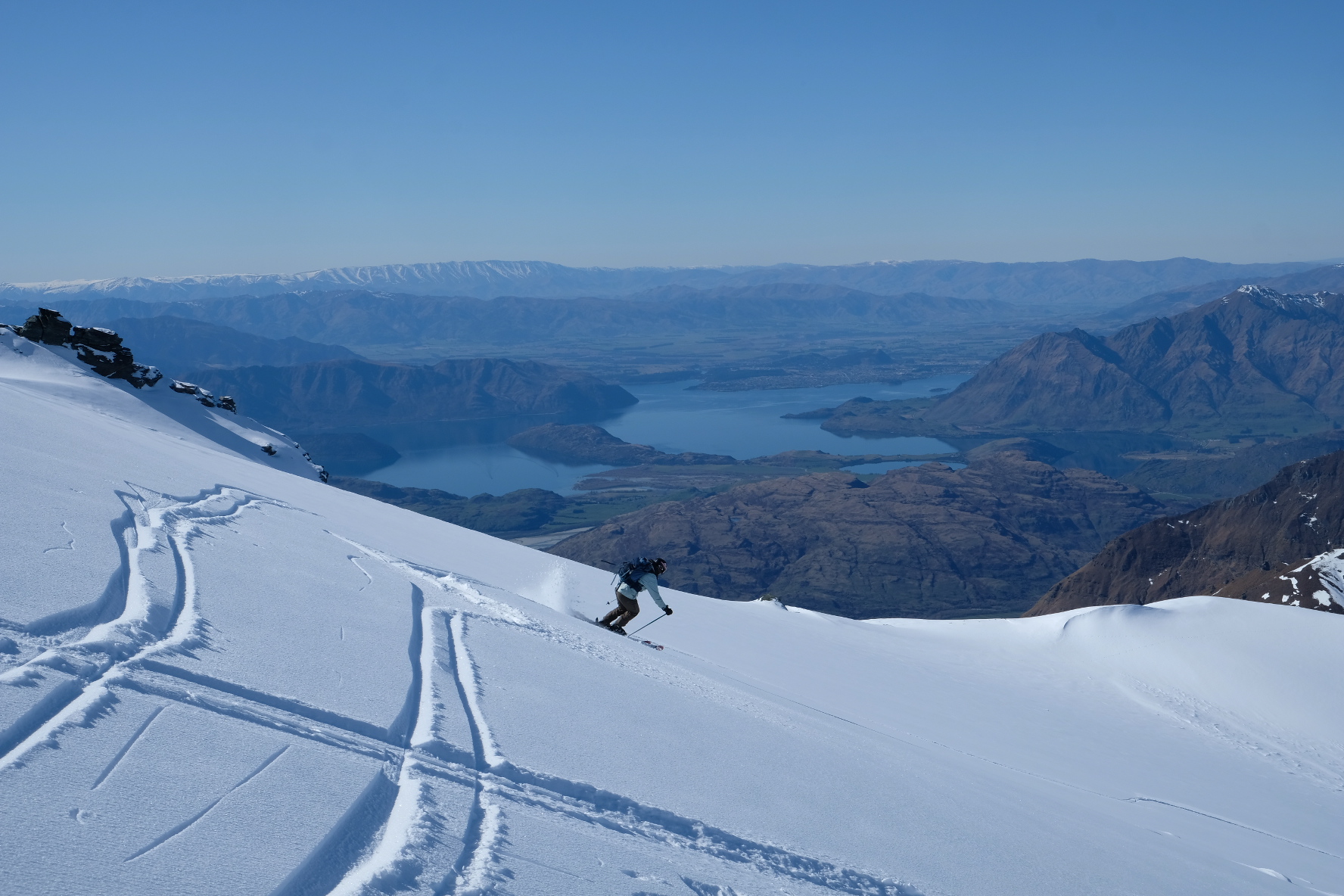
Moving forward, an incredible helicopter access trip you can do is the Black Peak (2,289m, 7,510ft) to Treble Cone trip. Aspiring Helicopters offer an excellent opportunity where you and four other mates can pay for a drop at the top of Black Peak and, from there, spend the day hiking and skiing back to Treble Cone following the ridgeline, which links the two up. The Heli-drop only costs about 100 NZD per person (five maximum) and drops you about 100m (330 feet) from the summit of Black Peak. The views are stunning, looking down at the Matukituki River, Lake Wanaka, Mt Aspiring, and the Harris Mountain Range section of the Southern Alps.
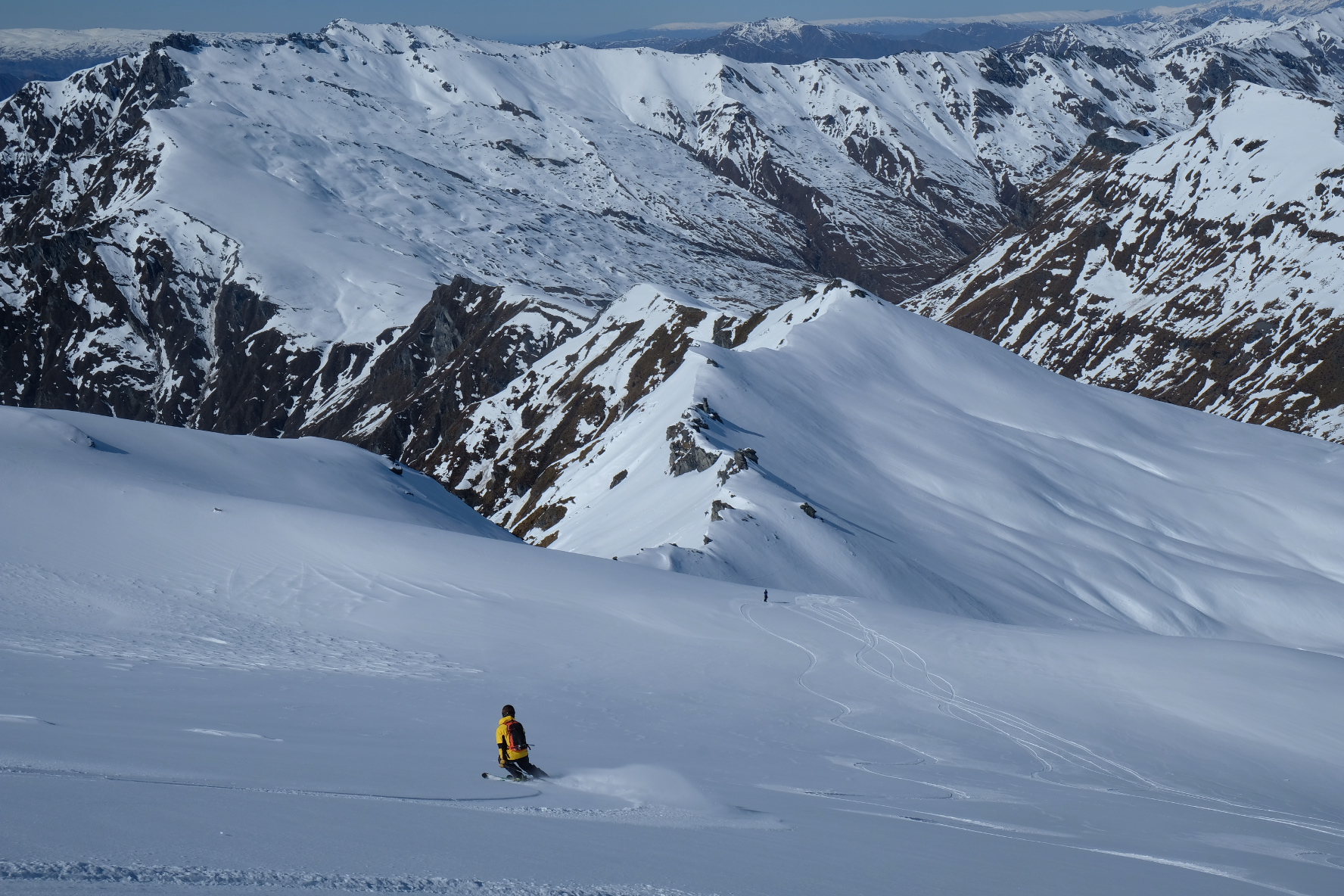
Other than following the ridgeline, there are alternative routes, but it depends on your walking. I recommend studying a topographical map for possibilities. Skitouring.nz also has a brilliant display on its website of two routes that can be taken. If you aren’t comfortable in the backcountry yet, then Wanaka Mountain Guides is a great company to go through. Black Peak also has a hut on the hill, which can be booked out. If you wish to stay, you can book with Aspiring Guides on their website for an epic alpine stay followed by some excellent skiing.
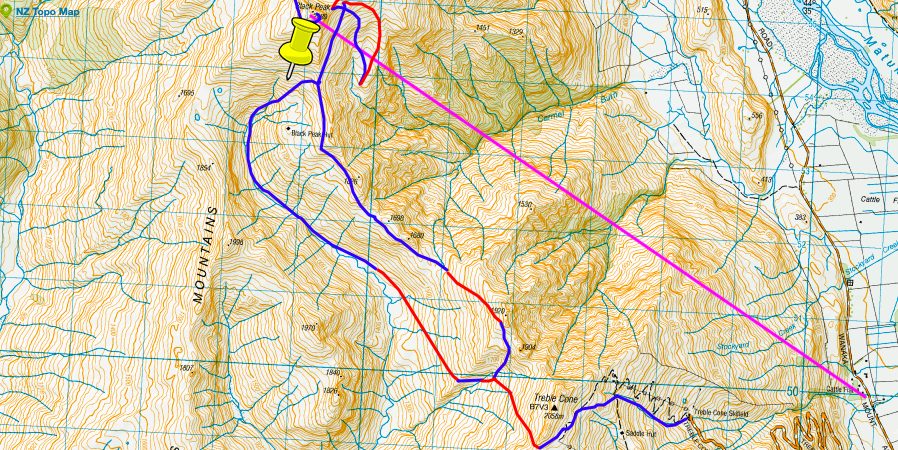
Last but not least of my hot spots in Otago’s backcountry is the ‘Grand Couloir’ at the Remarkables Ski Resort (2,319m, 7,608ft). This is quite an advanced touring spot, with two options to access this magnificent terrain. The first is up the gut, which requires some steep skinning and boot packing, and the second is a mountaineering route. Both can be accessed by foot or if you wish to cut down some walking time, you can use the lifts for one ride up. The mountaineering route requires climbing Single Cone, a gnarly peak to get on top of. If you aren’t comfortable with your climbing abilities, I suggest the route up the gut. Both routes require crampons and ice axes as the climb can get difficult with no fall zones.
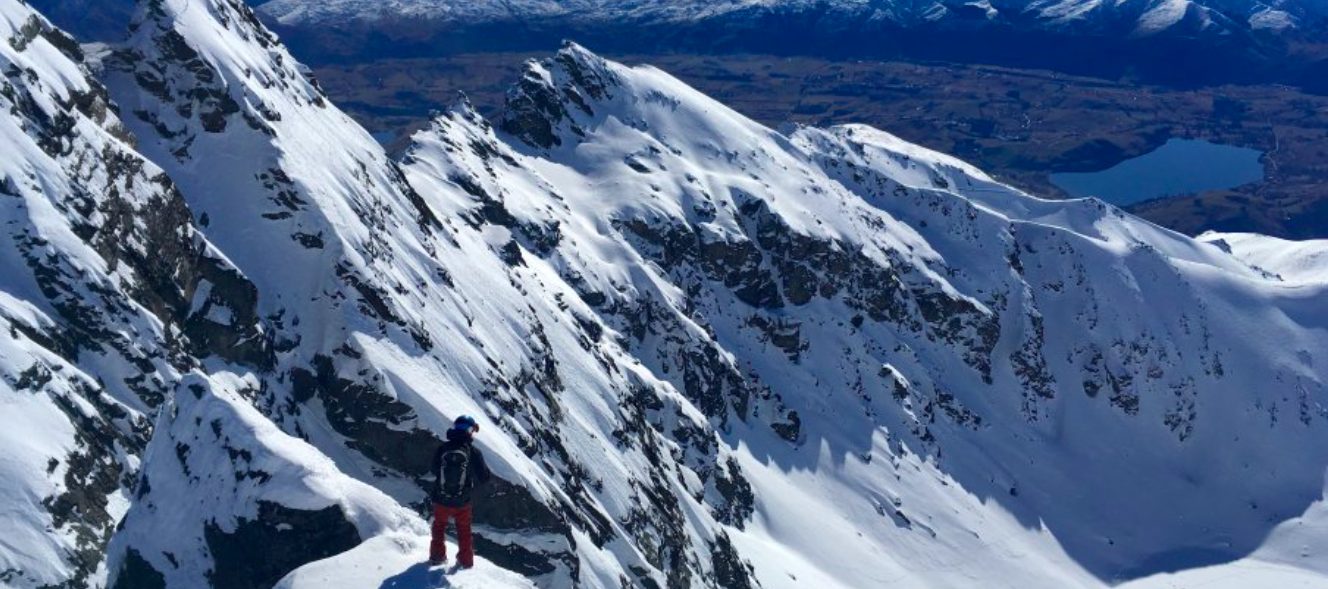
The ski down to Lake Alta is fantastic. Most of the terrain is in the mid 30’s, with some parts up to 40 degrees. Monitor the weather and snowpack conditions before heading out as it is on a Northeast aspect, meaning it is exposed to sun, and with the steep terrain, slides can be inevitable. To find more information on this, head to Skimo.co. Check in with the Remarkables ski patrol before heading out to discuss any avalanche hazards and what activity has been happening in the area.
As there are so many more options around the NZ regions during winter, I contacted my friend Tim Steward, a certified IFMGA (International Federation Of Mountain Guides Association) Mountain and Ski Guide, for some comments. Tim has lived and worked as a climb and ski guide in New Zealand (mainly based in Wanaka) for the last 15 years. He now has his own company – Wanaka Mountain Guides – which offers fantastic trips in both summer and winter.
Tim listed his idea of the top backcountry spots with huts included.
“Winter seasons are increasingly varied, but fortunately, the variety of locations in the south of the South Island means there is usually somewhere to go for good skiing and riding.”
“Starting for overnight trips around Wānaka, we have the Kirtle Burn hut in the Pisa Range and the Crown Basin Turk on the southern slopes of Mount Sale. While Kirtle Burn is a public DOC hut, Crown Basin is only bookable by members of the Mountain Turk Club. In both areas, there is mellow terrain suitable for all abilities of skiers and splitboarders.”
“Further north, there are the huts of the Cass Valley and Glenmore Station. These comfortable private huts can be accessed by 4WD or helicopter, and possible to travel between huts over multiple days. The area is rugged and on the edge of the Aoraki / Mount Cook National Park.”
“Closer to home is the amazing Whare Kea Chalet on the edge of Mount Aspiring National Park with its amazing outlook over the northeastern ramparts of Tititea / Mount Aspiring. There is a variety of terrain available right from the door of the privately owned Chalet.”
Tim then went on to label his personal favorites around the country.
“My favorite place for ski touring in later winter and spring is the high mountain huts of the Aoraki / Mount Cook and Westland National Parks, in particular the upper Haupapa / Tasman Glacier. Here, you get to stay in rustic mountain huts, ski through amazing glacier features, surrounded by New Zealand’s highest peaks, including Aoraki / Mount Cook.”
To finish, Tim stated his opinion on snow safety training before the backcountry days and how crowded the New Zealand backcountry can get.
“The local lift-accessed backcountry is getting busier with a lot of locals being turned off by the busyness and price of ski field skiing. I see an increasing interest in avalanche skills courses and skis and split board touring courses. Before you head out in the backcountry, make sure you get avalanche skills training to stay safe. These courses cover trip planning, identifying avalanche terrain, interpreting the avalanche and weather forecasts, as well as practice in companion rescue (while hoping you will never have to use it).”
The Otago region is only my preferred area for skiing, but there is so much more to access. If you aren’t confident in the backcountry and want guidance to see what NZ offers, an excellent option is Wanaka Mountain Guides. While based in Wanaka, they also go to NZ’s glaciers and around the country on hut trips. If you are a confident backcountry bandit and want to get after the fresh snow, make sure all your kit is in order and refer to the NZ Avalanche Advisory for avalanche forecasting. It is an excellent source of information. While not being relevant to a particular slope you are on, it gives a general and thorough examination of the regions across NZ.
One thought on “Top 5 Zones in Otago Region’s Exquisite Backcountry in New Zealand”